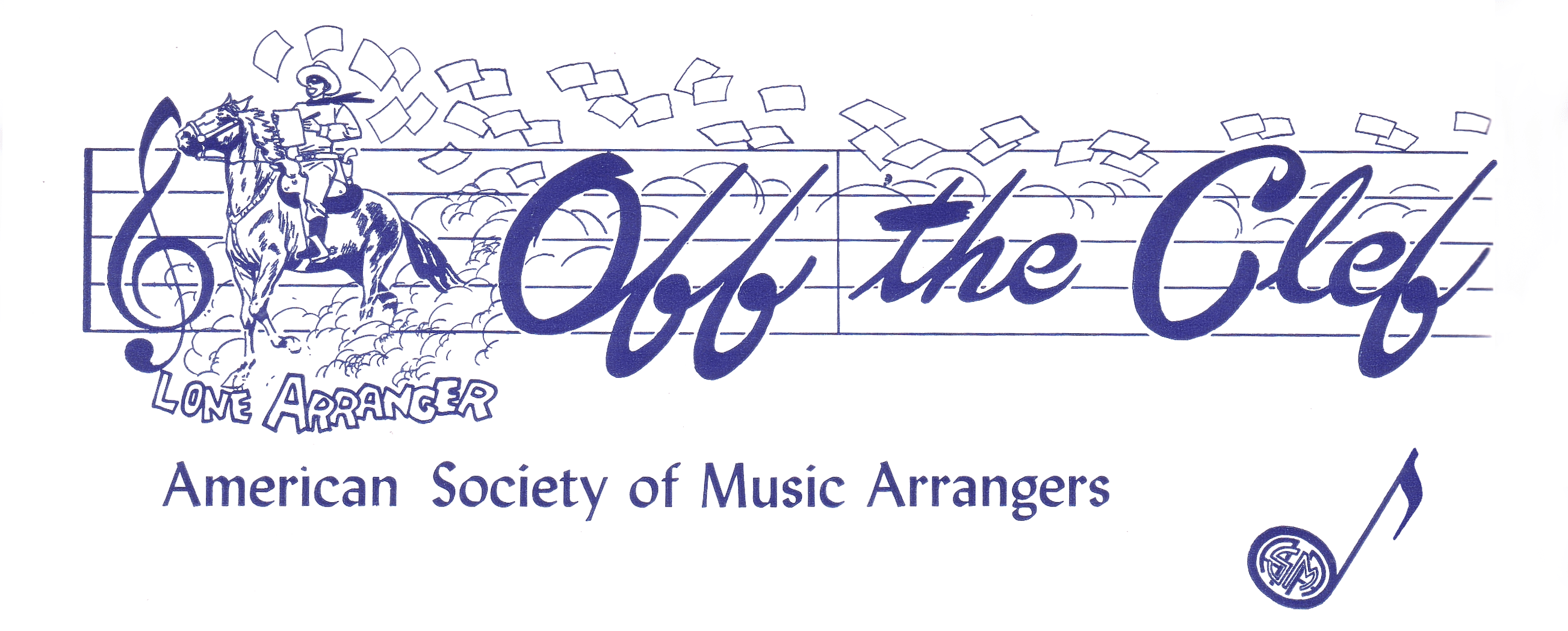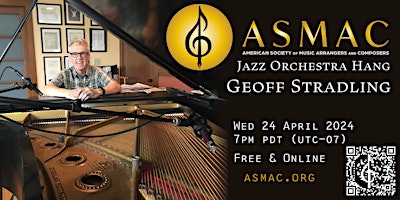
Lone Arranger Masthead for ASMAC “Off the Clef” Issue.
Arrangers Seeking Credit in the 1930s
The issues related to arrangers being relegated to second-class citizenship in the music industry and particularly the Hollywood studios, came to a head in the 1930s. Pressure was building, as Hollywood composers sought greater recognition for their contributions as composers of the film score. Some arrangers and orchestrators felt that singling out the composers for special recognition diminished their contributions to film scoring. They knew that some composers could not work professionally without arrangers and orchestrators supporting their work. The composers (songwriters) were often hired because of their celebrity (especially in New York) and brought to Hollywood with highly paid contracts and much hoopla. The arrangers and orchestrators considered some of these composers to be mere “tunesmiths” or “hummers.”[1] They felt that, if given a chance, they could write top-quality original music for film and television.[2]
In 1951, former president of what was then called the American Society of Music Arrangers (ASMA), composer Herschel Gilbert, wrote about how arrangers formed an advocacy group:
We who are recreating other peoples’ tunes and melodies are finding ourselves relegated to the background (like laboratory technicians) instead of attaining the rightful, creative position we should occupy. As we probe deeply into the reasons for our backward position we find many people who claim to be in our favor, who actually are against us because they feel our gain may be their loss. . . . All these fears are groundless . . . and rather naïve, for increasing the status of the arranger can only increase the importance of the men [and women] in associated jobs, namely the composer, songwriter, and publisher.[3]
ASMAC began on January 13, 1938, as ASMA, to represent the interests of music arrangers. With the advent of sound film, arrangers had become critical members of motion picture music departments, but they were not paid well. Most arrangers, who worked on their own as individuals, were not receiving the same benefits and pay scales negotiated for instrumental musicians. The first important soundtrack agreement, of May 23, 1939, did not cover orchestrators and arrangers; individual orchestrators and arrangers had to negotiate fees on their own. Some arrangers started to demand a five-dollar minimum; others were getting a flat fee of only a dollar or two per page. No one anticipated the problems and entanglements that arrangers and composers would get into, as a result of radio, sound films, and recordings, given the copyright laws that existed then. Eventually, the contracts negotiated for re-use of arrangements and compositions.
In 1921, Charles Maxwell tried, without success, to organize the arrangers in New York City. Leo Arnaud, Murray Cutter, and Charles Haggett tried again in 1933. But a group of Hollywood arrangers in 1937—including Wayne Allen, Ray Heindorf, John Leipold, Charles Maxwell, and Leonid Raab—asked J. W. Gillette, then president of Local 47 for help. After several months of working on a plan to create an organization, ASMA was announced on January 13, 1938, with the following goals:
to further the progress of our art; to gain greater recognition of our work; to establish a closer bond among members of our professions; to provide opportunity for social discussion and analysis of our work; to promote a mutual understanding with our contemporaries and; to work toward the fulfillment of the co-ordinate needs of all our members.[4]
In 1987, the name was changed to ASMAC, in recognition of the fact that most of its members were also active as composers.
Since the 1950s, the American Society of Music Arrangers and Composers has made significant progress in improving working conditions and compensation for arrangers and orchestrators, who are members of the American Federation of Musicians. However, there continue to be some common misunderstandings about what arrangers contribute to the music business. This is further exacerbated by the fact that essential skills of music arranging and orchestration are generally not well taught in university music departments and conservatories. ASMAC regularly hosts masterclasses on composing, arranging, and orchestrating, to help its members develop the necessary skills to work professionally in the field.
Jeannie Gayle Pool, Ph.D., composer, arranger, musicologist, and producer, is a member of the ASMAC Board. She served as the archivist/musicologist for the Paramount studio music department from 1995 to 2012.
[1] A tunesmith is a composer of popular songs. Hummer is a derogatory term for someone who can hum an original tune and hired professional arrangers to write it down and devise an accompaniment. Professional arrangers are usually discrete about which of their clients are hummers, because they do not want to jeopardize the work relationship. Usually, someone will complain that someone is a hummer, if there has been some problem in the working relationship, such as the arranger feels maligned and abused by the hummer. Hummers often have important talents, like a dramatic sense, crucial to film scoring. This is discussed below in more detail.
[2] There is evidence at Paramount that many of them tried. They wrote songs on their own time and submitted them for consideration for films; some of them were actually used in films; most were not, but were saved by the department music librarian.
[3] Need reference for this quote.
[4] Need footnote here.



